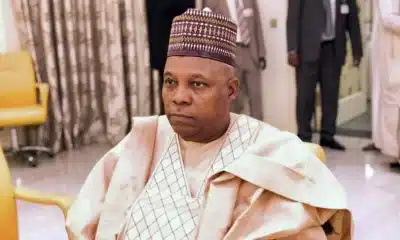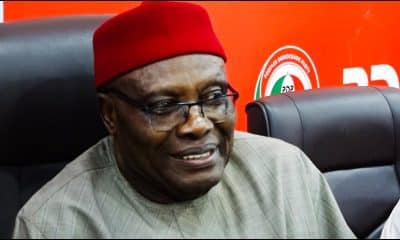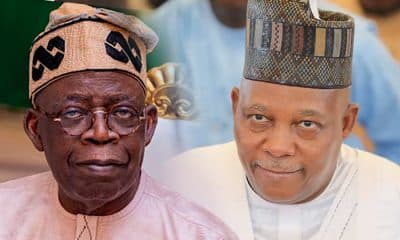Nigeria News
VP Shettima Backs Nigeria’s Federalism, Identifies Key Challenges

Vice President Kashim Shettima has identified corruption, rather than the lack of true federalism, as Nigeria’s primary obstacle to development.
Speaking on Tuesday at the 17th edition of the Leadership Annual Conference and Award, held at the State House Banquet Hall in Abuja, Shettima underscored the mismanagement of resources as a significant factor that has hindered the nation’s progress.
The Vice President dismissed claims that Nigeria’s federalism is ineffective, asserting that no country operates a flawless federal system.
Addressing an audience that included industry leaders, political figures, and foreign diplomats, he warned against adopting foreign governance models without considering Nigeria’s unique socio-political and ethnic realities.
Represented by the Special Adviser to the President on Special Duties, Aliyu Modibbo Umar, Shettima stated: “The problems we attribute to our federal system often stem from the poor management of what is already within our grasp, not from any inherent flaw in our constitutional architecture. The issue is not merely how much each federating unit accrues but how judiciously such resources are utilised.”
Shettima assured that the current administration, led by President Bola Ahmed Tinubu, is tackling these challenges head-on. He highlighted reforms aimed at strengthening governance, including the push for local government autonomy through legal means.
“Distinguished ladies and gentlemen, this administration, under the leadership of His Excellency President Bola Ahmed Tinubu, is confronting this challenge directly. We have chosen the path of reform. It is bold, often difficult, but necessary. One such step is our unflinching pursuit of local government autonomy, a vision we realise through the sanctity of due legal process,” he noted.
According to him, recent Supreme Court rulings in favour of local government autonomy reaffirm the government’s commitment to grassroots governance.
A Unique Federalism for Nigeria
The Vice President also challenged critics who argue that Nigeria’s fiscal federalism is fundamentally flawed. He cautioned against comparisons with other nations, stressing that each federal system is shaped by its history and circumstances.
“To those who argue that Nigeria’s federalism is fundamentally flawed because of its fiscal nature, I urge caution. Federalism, as practised around the world, is not a one-size-fits-all system. There is no universal template. Each country’s federal arrangement is shaped by its history, culture, and political experience,” he noted.
Citing international examples, Shettima explained how federalism varies across countries. Canada’s system arose as a compromise between linguistic groups, Germany had to reform its structure to improve efficiency, and Spain still grapples with regional separatist movements despite fiscal concessions.
“What these examples show is that no federal system is perfect. Every federation evolves, reforming to meet its unique realities. Nigeria is no exception. We must resist the temptation to romanticise foreign systems or prescribe imported solutions that fail to account for our distinct social, ethnic, and demographic complexities,” he asserted.
Shettima stressed the need for a governance model tailored to Nigeria’s realities, one that promotes accountability and development at all levels. He further highlighted the administration’s fiscal policies—ranging from fuel subsidy removal to tax reforms—as steps toward a sustainable financial structure.
“Our national experience has shown, time and again, that the greatest threats to our progress have stemmed from the mismanagement of resources and corruption.”
He added that ordinary Nigerians care less about federalism’s theoretical framework and more about tangible benefits such as electricity, education, healthcare, and infrastructure.
Honouring Service and Leadership
In his address, Shettima also reflected on the significance of the awards presented at the event, urging honourees to view them as reminders of their duty to the nation.
“These honours must inspire in us a deeper sense of responsibility to be part of the reforms we seek and to become architects of the fiscal accountability we so urgently need,” he stated.
He commended Leadership Newspaper for fostering discussions on national development through the annual event, which he described as a critical platform for exchanging ideas and shaping legacies.
“While it is a profound honour to reflect on the essence of this occasion, the opportunity to engage in a conversation aimed at rethinking Nigeria’s federal system is both timely and necessary. I look forward to the depth and diversity of perspectives from our distinguished participants,” Shettima said.
The Vice President maintained that Nigeria’s primary challenge lies in the lack of collective fiscal responsibility rather than flaws in its federal structure.



![First Day In Office: See Inside Of VP Shettima's Office - [Photos]](https://www.naijanews.com/wp-content/uploads/2023/05/Shettima-in-Office-4-400x240.jpeg)
![First Day In Office: See Inside Of VP Shettima's Office - [Photos]](https://www.naijanews.com/wp-content/uploads/2023/05/Shettima-in-Office-4-80x80.jpeg)







